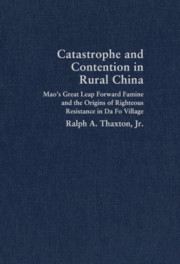 Catastrophe and Contention in Rural China
Catastrophe and Contention in Rural China Book contents
- Frontmatter
- Contents
- Acknowledgments
- Cast of Characters: Da Fo Village (Great Buddha), 1920–1993
- Chronology of Important Events
- Map 1 Provinces of China, neighboring countries, and area of study
- Map 2 Hebei-Shandong-Henan border area, showing location of Da Fo village
- INTRODUCTION
- 1 THE REPUBLICAN ERA AND THE EMERGENCE OF COMMUNIST LEADERSHIP DURING THE ANTI-JAPANESE WAR OF RESISTANCE
- 2 THE ASCENT OF THE VIGILANTE MILITIA: THE VIOLENT ANTECEDENTS OF MAO'S WAR COMMUNISM
- 3 THE ONSET OF COLLECTIVIZATION AND POPULAR DISSATISFACTION WITH MAO'S “YELLOW BOMB” ROAD
- 4 THE MANDATE ABANDONED: THE DISASTER OF THE GREAT LEAP FORWARD
- 5 STRATEGIES OF SURVIVAL AND THEIR ELIMINATION IN THE GREAT LEAP FORWARD
- 6 THE ESCAPE FROM FAMINE AND DEATH
- 7 INDIGNATION AND FRUSTRATED RETALIATION: THE POLITICS OF DISENGAGEMENT
- 8 THE MARKET COMES FIRST: THE ECONOMICS OF DISENGAGEMENT AND THE ORIGINS OF REFORM
- 9 PERSISTENT MEMORIES AND LONG-DELAYED RETALIATION IN THE REFORM ERA
- CONCLUSION
- Bibliography
- Index
- Plate section
7 - INDIGNATION AND FRUSTRATED RETALIATION: THE POLITICS OF DISENGAGEMENT
Published online by Cambridge University Press: 14 May 2010
- Frontmatter
- Contents
- Acknowledgments
- Cast of Characters: Da Fo Village (Great Buddha), 1920–1993
- Chronology of Important Events
- Map 1 Provinces of China, neighboring countries, and area of study
- Map 2 Hebei-Shandong-Henan border area, showing location of Da Fo village
- INTRODUCTION
- 1 THE REPUBLICAN ERA AND THE EMERGENCE OF COMMUNIST LEADERSHIP DURING THE ANTI-JAPANESE WAR OF RESISTANCE
- 2 THE ASCENT OF THE VIGILANTE MILITIA: THE VIOLENT ANTECEDENTS OF MAO'S WAR COMMUNISM
- 3 THE ONSET OF COLLECTIVIZATION AND POPULAR DISSATISFACTION WITH MAO'S “YELLOW BOMB” ROAD
- 4 THE MANDATE ABANDONED: THE DISASTER OF THE GREAT LEAP FORWARD
- 5 STRATEGIES OF SURVIVAL AND THEIR ELIMINATION IN THE GREAT LEAP FORWARD
- 6 THE ESCAPE FROM FAMINE AND DEATH
- 7 INDIGNATION AND FRUSTRATED RETALIATION: THE POLITICS OF DISENGAGEMENT
- 8 THE MARKET COMES FIRST: THE ECONOMICS OF DISENGAGEMENT AND THE ORIGINS OF REFORM
- 9 PERSISTENT MEMORIES AND LONG-DELAYED RETALIATION IN THE REFORM ERA
- CONCLUSION
- Bibliography
- Index
- Plate section
Summary
Whereas it is well established that the absence of any institutionalized checks on the Maoist abuse of centralized state power subjected villagers to socialist famine, one school of thought, expressed eloquently by Dali Yang, argues that the Great Leap famine delegitimated only the people's commune while leaving the legitimacy of the party-led state itself more or less intact in the minds of rural people. The memories of Da Fo's famine survivors illuminate, however, that Dali Yang's thesis does not hold for this Chinese village, where villagers came to see local party leaders as illegitimate due specifically to their poor leadership and political misbehavior during the Great Leap Forward, not simply because of their association with the commune. People understood their behavior was inseparable from the party-state to which they were loyal.
The behavior of the party's representatives in the aftermath of the famine only compounded the problem. If a famine-subjected state must forge an anti-famine contract with its people in order to retain its legitimacy, as Alex de Waal has argued, then it was incumbent upon the government of the PRC in the wake of the Great Leap Forward Famine to make its disgraced leaders at all levels accept accountability for their errors, to introduce greater institutional openness and transparency, and to transfer regulatory power over food into the hands of famine-vulnerable farmers, returning to them the prerogative of provisioning themselves before the state. None of this happened.
- Type
- Chapter
- Information
- Catastrophe and Contention in Rural ChinaMao's Great Leap Forward Famine and the Origins of Righteous Resistance in Da Fo Village, pp. 231 - 267Publisher: Cambridge University PressPrint publication year: 2008


